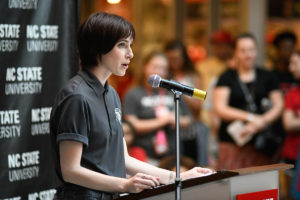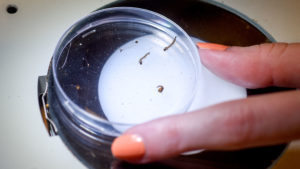She Finds Her Calling in Student Government

In April, life got a little simpler for graduate student Meredith Spence Beaulieu, who turned over her duties after serving a year as NC State University’s student body vice president.
In 2018, Spence Beaulieu became the first graduate student elected vice president, a student government office that was created about five years ago. She ran for the office with Jess Errico, an undergraduate who served as student government president in 2018-19.
Now Spence Beaulieu is back to her normal busy life as a Ph.D. student in entomology, working in the lab and at her weekend job at a veterinary clinic. But speaking in her student government office a month before her term ended, she had no regrets about the time commitment she made to leadership.
“One of the benefits of having a graduate student in this role is that any room that you’re in, you are able to voice the graduate student perspective,” she said. “And while that may not always lead to drastic improvements right away, I think it does change the conversation. I feel like it’s beneficial.”
Earlier this year, Spence Beaulieu was the student winner of NC State’s Equity for Women Award, given at the university’s annual Sisterhood Dinner. She was recognized in part for her efforts to provide affordable child care for the children of graduate students.
“It is extremely busy,” Spence Beaulieu said of her life in student government. “I was quite over-committed, but it was in a good way. It was a struggle trying to balance particularly my research responsibilities with this role (of student body vice president), because this role was quite time intensive if you’re doing it right. I feel like I finally figured out how to do it correctly and how to be productive in my research as well. But it was tough to figure out in the beginning.”

Spence Beaulieu’s route to student government started when she served as a representative to the NC State Graduate Student Association from the Entomology Graduate Student Association. She got fired up – her words – about the cost of student fees to graduate students, and she found that the most effective way to have an impact on fees was through the Student Senate.
GSA had created a new officer position to interface with student government and encourage graduate students to serve on Student Senate, so Spence Beaulieu took on the role, making her a member of the executive cabinets for both student government and the GSA. And she saw some success – last year, student fees didn’t go up for the first time since 1999, she said.
Jess Errico was serving as student body chief justice and was impressed with Spence Beaulieu’s skills on policy matters. Candidates for student government president and vice president run on the same ticket, so Errico asked Spence Beaulieu to be her running mate.
As vice president, Spence Beaulieu has tried to represent the interests of graduate students whenever she can. “It’s tough to advocate for the things that will actually make a difference to graduate students, like stipends. The things that matter a lot to graduate students are complex,” she said.
But she does point to some achievements, like helping to hold the line on student fees. The cost of student fees for graduate students is an issue because most graduate student funding sources won’t cover fees, and often students must pay these out of pocket.
In addition, Spence Beaulieu helped create one solution to childcare needs for graduate students’ children. The university at one time had partnered with a local childcare center to provide care for the children of faculty and staff. But the cost of the center was high and not available to graduate students’ children.
“We have partnered with Meredith College, which has an after-school enrichment program that’s low-cost. And they’ve partnered with us to allow graduate students and postdocs to utilize that service. It’s only for certain school-age children, and provides after-school care, so it’s not perfect, but it’s a step,” she said.
Spence Beaulieu also was instrumental in helping establish a graduation robe lending service to provide robes to students for whom the expense of a robe might prevent from attending graduation, she said. The robes are made available through the university’s Career Development Center. Last year, only undergraduate robes were offered through a pilot program, but this year there will be some master’s robes available for graduates to borrow.

She was extremely grateful to Michael Reiskind, the principle investigator of her research lab, for supporting her student government involvement.
“Dr. Reiskind is fantastic. I think he was quietly skeptical, but vocally supportive, about me taking on these roles because it does take you out of the lab,” she said. “He’s very much, ‘if this what you want to do, who am I to say no?’ So I think he was concerned, but he’s been supportive throughout.”
Spence Beaulieu came to NC State as an undergraduate, earning her bachelor’s degree in zoology with a minor in mathematics. Her goal was to get into veterinary medical school, so she started working at a local veterinary clinic to gain some necessary experience. But she discovered that the business-owner side of being a vet didn’t appeal to her.
As an animal lover and devoted pet owner, she wanted to approach a veterinary medical research problem through the field of entomology. So Reiskind’s public health entomology lab was a perfect fit.
Spence Beaulieu studies how suburban development affects the types and numbers of mosquitoes in an area, and she uses dog heartworm as a model. Heartworm disease is spread by more than 30 species of mosquitoes in the Southeast and can eventually kill dogs that are infected.
When an infected mosquito bites a dog, the heartworm parasite swims into bloodstream and migrates to dog’s lungs and heart. Adult worms in a dog’s arteries will eventually clog the heart and cause heart failure. Cats also are affected by heartworms, but in a different way: their immune system is overactive in attacking the worms and can result in respiratory distress for cats.
Her field work involves identifying the types of mosquitoes found in suburban areas. In the lab, she looks for the presence of heartworm disease in those mosquitoes. She uses the data to develop a mathematical model of the disease transmission.

Her first two years of graduate school were funded through her lab. After that, she received a National Science Foundation Graduate Research Fellowship that has taken her through the remaining three years of her program. She credits her success in receiving the grant to a grant-writing class taught by entomology’s Hannah Burrack – three students in the class received the prestigious NSF fellowships the same year.
With her student government service behind her, Spence Beaulieu will have more time for her husband Matt and their beloved fur family – Wren, a lab mix; boxers Cora and Logan, Grim the cat, and two rats, Finch and Skiba. And her time at NC State is coming to a close – her Ph.D. defense is planned for late summer.
Her career interest is more closely aligned with developing science policy than in working in a lab. And for those types of jobs, she has relied more on her leadership experience than on her academic or research experience. As a student government leader, she gained skills like time management, leadership, communications and respect for diversity.
Her advice to other graduate students interested in leadership positions is don’t let a faculty member talk you out of it. “If your PI doesn’t want you to get involved, fight back,” she said. “Don’t give in to the idea that, ‘my advisor just won’t let me – I have to be in the lab from 9 to 5.’ These experiences not only build critical and marketable skills, but also let you make a positive impact on the graduate experience for future students.”
- Categories:


